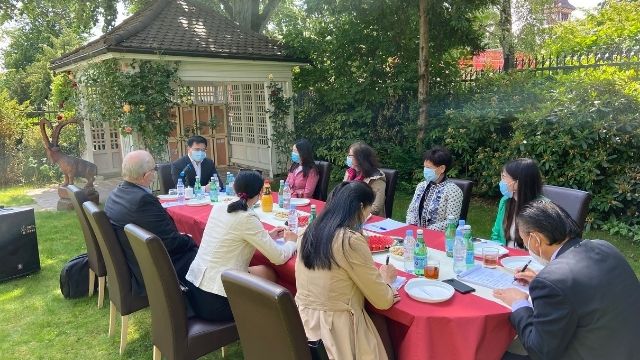After the scandal of the secret deal on migrants and refugees, a study by the specialized Czech center Sinopsis sheds new light on a strange relationship.
by Rosita Šorytė
Earlier this month, I published in Bitter Winter a study of a secret 2015 agreement, leaked to some Swiss media and published in its entirety by the Spanish NGO Safeguard Defenders, allowing China to send to Switzerland, at Swiss taxpayers’ expenses, Ministry of Public Security agents to advise immigration authorities on which Chinese citizens who entered the country should be sent back home. After several media criticized the secret deal, Switzerland announced that the agreement, which expired on December 7, will not be renewed.
Unrelated, yet connected, to the scandal of the secret agreement, a report published on December 18 by the authoritative Czech center for Chinese studies Sinopsis and signed by Ralph Weber, Director of the MA and PhD Programs in European Global Studies at the University of Basel, shed new light on how China exerts its influence on Switzerland.
The premise of the study is that the CCP under Xi Jinping mostly uses the United Front for controlling Chinese living overseas and organizing the propaganda abroad. In 2018, Bitter Winter reviewed a detailed report by the bipartisan U.S.-China Economic and Security Review Commission, explaining how the United Front carries out its work.
Switzerland appears to be a textbook case of United Front activities. Weber’s main point is that the United Front in Switzerland delivers a “unified message” in a “rhizomatic” way. Non-academics may not understand the word “rhizomatic,” which is not explained in the text either. It derives from the postmodernist philosophy of Gilles Deleuze and Félix Guattari, and means a non-linear, non-hierarchical, yet effective diffusion of ideas. What Weber wants to emphasize is that there is no unified structure to deliver the United Front propaganda in Switzerland, but this makes Chinese disinformation more rather than less effective.
The United Front operates in Switzerland, Weber explains, in two parallel ways that only occasionally meet each other. The first is through the control of a myriad of associations organizing the Chinese living in Switzerland, some of them Swiss citizens. There are associations for the different provinces from where this diaspora comes from, for the different age groups, for the different professions.
Since promoting exchanges in the field of science (and perhaps acquiring Western technology the Chinese do not yet possess) is important, the Chinese Association of Science and Technology Switzerland has a key role. The two main entities appear to be the Federation of Overseas Chinese Associations in Switzerland, which brings together dozens of associations and make sure they remain under the control of the United Front, and the Association of Merchants and Entrepreneurs of Chinese Origin, whose leaders and key members have direct ties with the United Front.
These associations sometimes do not like each other, and compete for recognition and funds, which may depend on who is the current Chinese ambassador in Bern. But this competition is part of the “rhizomatic” model adopted by the United Front, and does not prevent them from achieving results.

The report also calls the attention on the European Jiangxi Hometown Association, which presents itself as the association of Chinese from the province of Jiangxi living in Europe, but whose main activity is in fact to operate the Web site Eurasia.info, a main vehicle for CCP international propaganda.
The second branch of the United Front activity in Switzerland is to promote and infiltrate associations of businesspersons, “high-level politicians, and influential civil-society actors” who are, or may be led to become, friendly to China. These include the Parliamentary Group Switzerland-China, the Swiss-Chinese Association, various entities dealing with China within the Swiss Trade Association, as well as local groups in different Swiss cantons.
The members of these associations are not necessarily aware of the role played there by the United Front, but all make what Weber calls a basic mistake. They assume that their Chinese counterparts also represent the civil society or an independent Parliament, while they are simply bureaucrats working on behalf of the CCP.
Swiss trans-national companies who operate in China also adopt, like their counterparts in the United States, the United Kingdom, or the European Union, the practice of including in their boards of directors members of the CCP or of United Front organizations. While they may claim these are simply figureheads with no real power, coopted to gain the sympathy of the Chinese authorities, the report argues that they may be more influential than the companies themselves believe.
Of course, Weber concludes, in a democratic country one is free of being pro-Chinese or of believing that the CCP is a benevolent organization. The problem is when ties to China are cultivated secretly. Singularly considered, incidents where China appears to influence Swiss society, politics, and media, often imposing propaganda narratives on issues such as Taiwan, Hong Kong, Tibet, Xinjiang, human rights, and religious liberty, may appear as minor. But, the report argues, when all these incidents are considered together—which is difficult precisely because of the elusive “rhizomatic” model—they “hint at larger patterns that are likely to entail serious consequences only cumulatively and over a longer period of time.”
Reading the report, there is one aspect favorable to Switzerland that emerges. While the extent of CCP propaganda and influence in the country is disturbing, the Swiss democratic system at least makes most documents available to persistent researchers such as Weber. The Swiss-Chinese deal on migrants and refugees became a scandal not so much for its content, but because it was kept secret—and in the end even this document was leaked to the press.
Perhaps, the situation is more dangerous in countries where the United Front and the CCP presumably operate in the same way, but obtaining documents and learning what agreements they may have signed with the local governments is much more difficult.
Source: Bitter Winter












